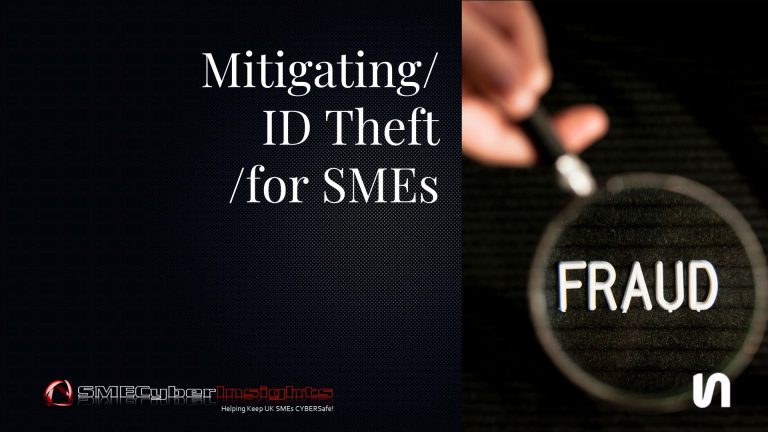SME IDENTITY THEFT: SME IDENTITY THEFT KPI/ Mitigating Identity Theft for SMEs
August 29, 2024IDENTITY THEFT & Guarding Against Identity Theft – CyberKPI: Defending Your Small Business. A Comprehensive Guide to Preventing Identity Theft in Small Enterprises Across the UK and EU. Discover how identity theft poses significant risks to Small Businesses in the UK and EU, along with effective strategies for protection and compliance.
Identity Theft Risks for Small Businesses
Identity Theft refers to the act of stealing personal information to commit fraud, impacting both individuals and businesses. In the UK, it is estimated that identity fraud costs businesses approximately £2.7 billion annually, a staggering figure that highlights the vulnerability of Small Businesses in particular. These smaller enterprises often lack the robust cybersecurity measures that larger corporations might possess, making them easier targets for identity thieves. Alarmingly, only 13% of fraud cases are reported to the relevant authorities, indicating a significant level of underreporting and a potential lack of awareness regarding the risks involved. Businesses are 67% more likely to experience a cyber incident than a physical theft, underscoring the importance of digital security in today’s business environment.
Small Businesses often face unique challenges in protecting themselves against Identity Theft. They may not have dedicated IT staff to manage cybersecurity or the financial resources to invest in advanced security systems. This makes them appealing targets for fraudsters, who can exploit weak security protocols. For example, a local café could be compromised through a data breach if its payment processing system lacking adequate encryption, leading to the theft of customer credit card data.
Common Methods of Identity Theft Targeting Small Businesses
There are several common methods employed by identity thieves to target small businesses. Phishing attacks are particularly prevalent, where criminals impersonate legitimate entities to steal sensitive information through deceptive emails or messages. For instance, a small retail store might receive an email that appears to be from its bank, prompting the owner to provide login credentials, which the thief can then use to access the business’s accounts.
Social engineering tactics also play a significant role in Identity Theft, exploiting human psychology to trick employees into revealing confidential data. For example, an employee might receive a phone call from someone posing as a tech support agent, who persuades them to share sensitive information. Additionally, data breaches can occur when hackers gain unauthorised access to company databases, exposing sensitive customer and business information. Credential stuffing is another growing concern, where attackers use login credentials obtained from one breach to access other accounts, further amplifying the risks for Small Businesses.
Impact of Identity Theft on Small Businesses
The impact of Identity Theft on Small Businesses can be devastating both financially and reputationally. Financial losses from Identity Theft incidents can average around £21,000 per occurrence, a sum that can severely affect the cash flow of a small enterprise. Furthermore, approximately 31% of businesses report operational disruptions arising from cyber incidents, which can lead to decreased productivity and customer dissatisfaction.
The reputational damage stemming from Identity Theft can result in a significant loss of customer trust, with 67% of businesses opting to keep cyber incidents private, potentially alienating their customer base. Additionally, small businesses may face legal consequences due to non-compliance with regulations such as GDPR, which can result in fines exceeding £17 million or 4% of annual turnover. The aftermath of an Identity Theft incident can lead to increased insurance premiums, as businesses become classified as higher risk for insurers.

Practical Steps for Protecting Against Identity Theft
To safeguard against Identity Theft, small businesses should implement strong cybersecurity measures, including firewalls, antivirus software, and encryption for sensitive data. Conducting regular audits of data security practices can help identify and rectify vulnerabilities, ensuring that potential gaps in security are addressed promptly.
Training employees to recognise and respond to Phishing attempts and social engineering tactics is crucial. Establishing robust identity verification processes for customer transactions can also prevent fraudulent activities, ensuring that businesses are vigilant in their operations. Additionally, regularly updating software and systems to patch vulnerabilities can significantly enhance overall security, reducing the risk of Identity Theft incidents.
Importance of GDPR Compliance and Data Protection Regulations
GDPR compliance plays a vital role in preventing Identity Theft for small businesses, mandating that they maintain strict Data Protection protocols to avoid hefty fines for non-compliance. Small Businesses must implement and document Data Protection measures to safeguard customer information and personal data. Regularly reviewing and updating privacy policies ensures compliance with evolving regulations, helping to mitigate risks associated with Identity Theft.
Conducting data protection impact assessments (DPIAs) for new projects or processes that may affect personal data is essential. Furthermore, ensuring that employees are aware of Data Protection Regulations and best practices is critical for compliance and risk mitigation. By fostering a culture of awareness, businesses can better protect themselves against Identity Theft.
Recommendations for Addressing Identity Theft Incidents
When Identity Theft incidents occur, businesses should report them to authorities such as Action Fraud (0300 123 2040) to help track and prevent further occurrences. Developing a clear response plan for addressing Identity Theft, including steps to take in the event of a breach, can streamline the recovery process.
Engaging with cybersecurity experts to assess vulnerabilities and strengthen security measures following an incident is also advisable. Small Businesses should consider Cyber Insurance policies that cover Identity Theft and related incidents for additional financial protection. Finally, having a communication strategy in place for informing customers and stakeholders about data breaches and the measures taken to mitigate risks helps maintain transparency and trust.

What is a VPN & Does my SME Need one? A VPN is a Virtual Private Network a method of securing your communications credentials. When it comes to Small and Medium-sized enterprises (SMEs), the choice of VPNs can significantly impact the security and efficiency of their operations.
The NordVPN service allows you to connect to 5600+ servers in 60+ countries. It secures your Internet data with military-grade encryption, ensures your web activity remains private and helps bypass geographic content restrictions online. Join NordVPN Today and Save up to 73% and Get 3 months Extra Free – Rude Not to …!
CYBER Insights – Helping keep Small Business CYBERSafe!
Launched in 2020 by Cybersecurity Journalist Iain Fraser and his team at IfOnlyCommunications, CYBERInsights was developed to be the go-to platform providing definitive, reliable & actionable Cybersecurity News, Intel & Awareness Training for SMEs throughout Europe (UK & EU) as they as they further embraced new Technologies and Business Practices.












